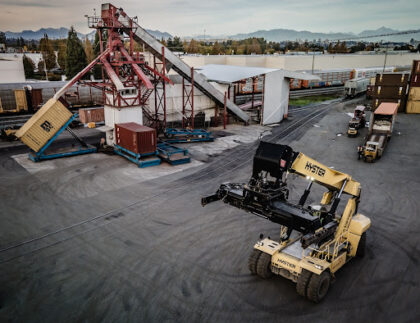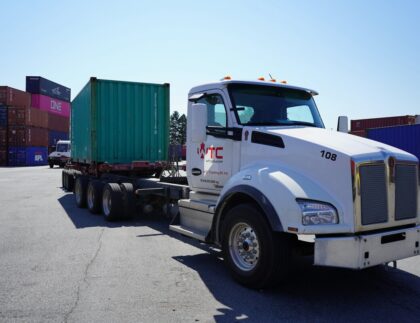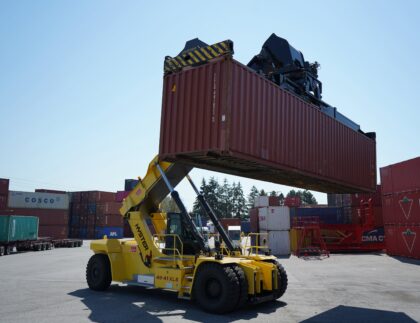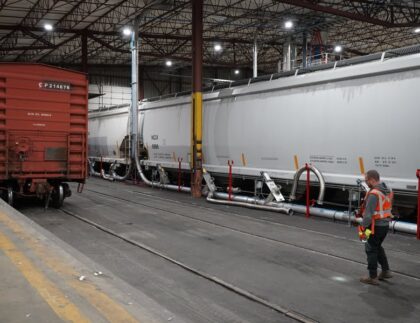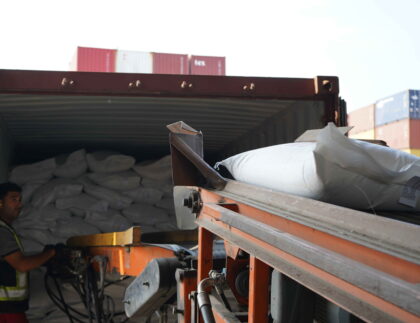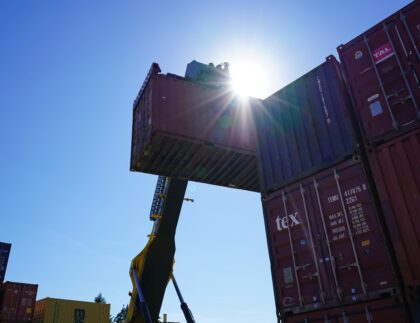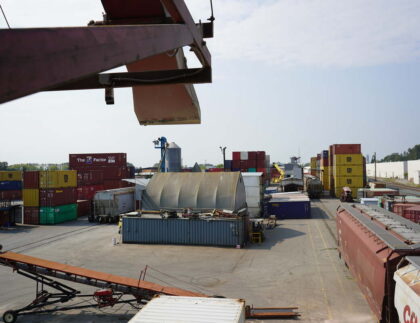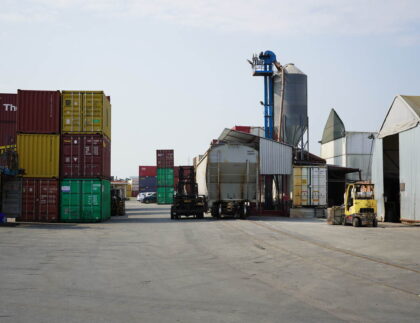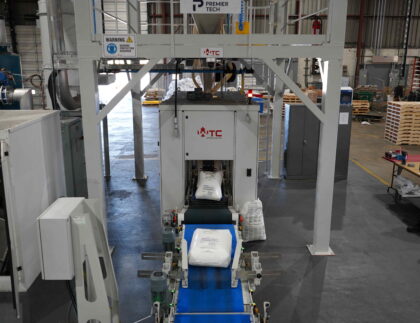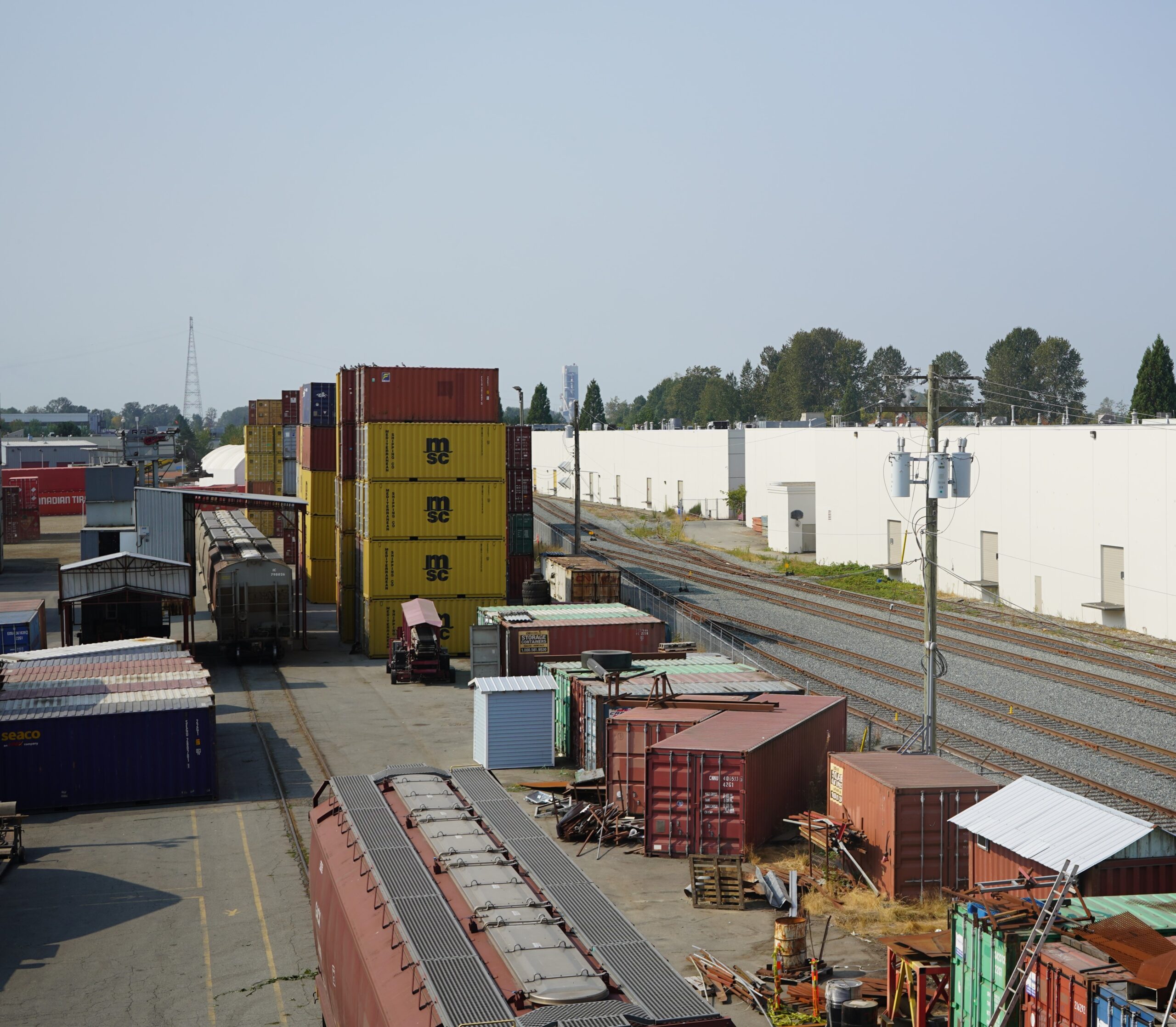
Canada may not be the world’s largest exporter of wheat, but Canada does supply 12% of the world’s market. Over 70 countries rely on wheat exports from Canada. In 2020, The Food and Agriculture Organization of the United Nations ranked Canada as the world’s #5 producer of wheat, following China, India, The Russian Federation, and the United States.
Demand for wheat and other grains and pulses currently exceeds supply, even though many countries are increasing their crop output. Farmers only benefit when the infrastructure is in place to get grains moved quickly to get to the marketplace fast. WTC Group’s logistics experts take your grains and crops from trucks and railcars to containers, intermodals, and ships, expediting loading and unloading and speeding your product to its destination. Learn more about WTC Group’s transloading process, E2E logistics services, and container terminal infrastructure that will simplify your shipping process.
What is Transloading? A Quick Overview
In intermodal shipping, products stay in the same container throughout their journey. Generally speaking, intermodal shipping is two or more modes of transportation, which could include truck, train, or ship. Transloading differs from intermodal shipping because the product might be unloaded between different means of conveyance. Grains or pulses might be unloaded from the truck containers before being loaded into rail cars or containers for shipping to their final destination. Transloading facilities have an essential role in handling bulk grains and crops.
WTC Group has a state-of-the-art loading system that can handle almost 13 tonnes per minute. We have one of the most technologically advanced containerization facilities in Canada. Over 300 containers can be loaded daily, which gets your crops to market faster.
What Types of Crops and Grains Can Be Shipped in Containers?
Canada is a leader in food production for many reasons. Wheat and canola are just two of the crops that support Canada’s economy. These grains do well in containerized shipping. Pulse crops like peas, lentils, and soybeans do even better in containers. Barley, corn, malt, and other bulk grains can also be shipped in containers.
Where Do Canada’s Crops and Grains Get Shipped?
Canada’s wheat crops are more protein than the rest of the world’s grains. Much of Canada’s wheat is shipped to China and the United States. Before the Russia-Ukraine crisis, some grains would be sent to Russia. Peru, South Korea, Mexico, and Japan also receive a good deal of wheat from Canada. In addition, Canada is the world’s biggest producer of canola. This grain is exported to the United States, the EU, Mexico, Japan, and China. Improvements in logistics can help grains get to more buyers around the world. WTC Group is helping improve Canada’s agriculture industry and international food security opportunities.
Coordination and Innovation for Moving Grains
Our logistics experts coordinate the movement of imported and exported items. We have one of the most advanced bulk containerization processes in Canada. Our transloading and Container Freight Station (CFS) services are centralized to get your product to the next stage in the journey quickly and efficiently. WTC, and our partners, have heavily invested in infrastructure to ensure your products reach their final destination in ideal shape. Our quality control systems and certifications give you peace of mind that your product isn’t tampered with nor compromised before it gets to the buyer. You can take advantage of our multi-modal transportation with one bill of lading.
Improvements to Our Infrastructure for Shipping Efficiency
The logistics industry relies on many organizations to get freight moved worldwide. The Government of Canada invests in roads and rails to move grains and crops across the country. The Southern Railway of British Columbia Limited (SRY) expanded its capacity by building a passing track and a second rail yard on Annacis Island, directly outside our busiest rail terminal. The countries that import Canada’s grains need to be prepared to receive the containers.
WTC Group has invested in its infrastructure to support the nation’s agriculture industry. Our new rail bulk handling system increases our grain loading capacity by sixfold. Now, we can handle almost 13 tonnes per minute at Terminal One. Grains and other crops can be dumped from railcars directly into containers, saving time and getting the product to market faster. Grains and crops have been one of our focus areas since our inception. With ongoing improvements, we continue to ensure producers have the logistics capability to keep up with the industry demands.
WTC Group also acquired land that enabled the company to double the size of its rail terminal on Annacis Island. Before the acquisition, only 1,500 containers could stay in storage in our yard. The expansion allows us to store up to 3,500 containers at Terminal One. This project also enables WTC Group to handle many more railcars per day.
WTC and SRY now boast the capability of receiving unit trains (a group of 100+ railcars simultaneously) in one switch and returning them in the same block. This was a significant milestone in our expansion in a world where Precision Schedule Railroading means efficiency and speed. These recent investments in infrastructure benefit all industry stakeholders with faster shipping times, more flexibility in the size of orders, and less product loss.
How Containerization Benefits Agriculture
Container shipping changed the way grains are shipped internationally. More recent changes allow farmers and producers to see more profits.
- Grain and crop shipments are less expensive, so even smaller orders can be shipped efficiently.
- New markets are opening up. Smaller buyers can import containerized grains at lower unit costs.
- Containers can be reloaded at the port with new items, thus improving logistics costs through two-way moves.
- Delivery speeds have increased. Shipping expenses have gone down. This efficiency improves the economies of scale for all of Canada’s agriculture industry.
Moving freight from the farm to international buyers was once very complex. Contracting different companies for each section of movement across the process took time, knowledge and effort. WTC Group has a seamless end-to-end process from trucking to warehousing, transloading, and exporting. As a result, our customers get accurate tracking information that is up to date and from a single source instead of managing multiple relationships.
Advanced Software Gives You Information and Insights
Our physical infrastructure is supported by a digital logistics software program called ShipSmpl, which connects to every journey point. As our customer, you can track every step of your shipment. Adjustments and decisions can be made to maximize savings or improve delivery efficiency. Partners can see Canadian Customs documentation on both imports and exports. This software has been custom designed to fit our processes.
As we’ve developed better processes, our experts have improved our software to improve operations and ensure legal compliance. We believe in integrity and transparency while serving our clients and stakeholders with innovation.
Sustainable Logistics When Shipping Grains and Crops
Shipping companies must be acutely aware of the environment they must operate. WTC Group is a proud member of Operation CleanSweep, a global organization that fights plastic pollution. Containerization reduces the need to package grains before getting them to the buyer. We have pledged our commitment to a clean environment, not only in how we process plastics and our overall business model. We are also a certified organic handling company via Pro-Cert Organic, which allows us to connect exporters' organically grown crops to buyers worldwide.
WTC’s most recent sustainability project, which involves a GVW variance from the provincial MOTI, allows us to haul two loaded grain containers to the port with a single truck. With this project now complete, it will reduce our annual truck movements by approximately 35% while freeing up more capacity to transport more containers to the ports.
Balancing financial growth with environmental care is a priority. Our capacity-building improvement assessed how we could lower CO2 emissions and noise pollution while maximizing the efficiency of our system. We take sustainable logistics seriously because we know that Canadians support and value nature, wildlife, and a green future.
ship simpler™ with WTC Group
Shipping with simplicity may seem like an oxymoron as the logistics industry is complicated. However, the WTC Group is committed to clarity and transparency in logistics. We do this by investing in our infrastructure and constantly striving to break problems into solvable pieces.
- E Technology – Our in-house development team builds and maintains our custom logistics software that gives customers accurate tracking information from end to end. We utilize our software's information to adjust a shipment in real-time and expedite your freight through its journey. It takes effort and ingenuity to turn raw data into valuable pieces of information.
- Coordinated moves – Our software analyzes information as your freight travels across the country. You can rest assured that we will pass along any cost savings to our customers through our efficiencies.
- Strong working relationships – We partner with hundreds of other organizations and businesses that we have to deal with to facilitate importing and exporting. This helps us get premium-tier rates and deal with the daily logistics challenges through each step so that you don’t have to.
- Official container terminal status – WTC Group has agreements with Canada’s leading ocean carriers, which allows us to trade services and leverage volume for special considerations.
- Experience – We have 20 years and counting in the logistics industry. We know how to get your goods where they need to go. Our proprietary software moves your freight with fewer trips and more efficiency.
- Increased capacity – We’ve developed our process of simplicity by being centrally located and accessible to the rails and ports in Vancouver. We make it easy to get your crops and grains out of Canada through our services because our volume has reached critical mass such that we receive premium rates and preferential service from our supply chain partners.
Take Advantage of Our Expertise with Bulk and Specialty Transloading
Since our beginnings in 2002, our mission has been to simplify your life by simplifying the movement of goods across the globe. We’ve built a team of over 200 talented and driven people to solve your logistical challenges. We have a vast network around the world that also supports our vision. With our state-of-the-art facilities and proprietary technology that we’ve developed to exceed industry requirements, we can pick up your crops and grains anywhere in Canada and ship them to any corner of the globe.
We are located in British Columbia but serve customers across Canada and around the world. Partner with us for expert logistics services.
Contact us online or call 1-844-WTC-GRUP (982-4787) to learn more about our transloading process for grains and crops.


